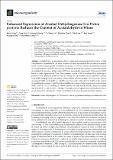Enhanced Expression of Alcohol Dehydrogenase I in Pichia pastoris Reduces the Content of Acetaldehyde in Wines
Author(s)
Geng, Kun; Lin, Ying; Zheng, Xueyun; Li, Cheng; Chen, Shuting; Ling, He; Yang, Jun; Zhu, Xiangyu; Liang, Shuli; ... Show more Show less
Downloadmicroorganisms-12-00038-v2.pdf (3.891Mb)
Publisher with Creative Commons License
Publisher with Creative Commons License
Creative Commons Attribution
Terms of use
Metadata
Show full item recordAbstract
Acetaldehyde is an important carbonyl compound commonly detected in wines. A high concentration of acetaldehyde can affect the flavor of wines and result in adverse effects on human health. Alcohol dehydrogenase I (ADH1) in <i>Saccharomyces cerevisiae</i> catalyzes the reduction reaction of acetaldehyde into ethanol in the presence of cofactors, showing the potential to reduce the content of acetaldehyde in wines. In this study, <i>ADH1</i> was successfully expressed in <i>Pichia pastoris</i> GS115 based on codon optimization. Then, the expression level of <i>ADH1</i> was enhanced by replacing its promoter with optimized promoters and increasing the copy number of the expression cassette, with ADH1 being purified using nickel column affinity chromatography. The enzymatic activity of purified ADH1 reached 605.44 ± 44.30 U/mg. The results of the effect of ADH1 on the content of acetaldehyde in wine revealed that the acetaldehyde content of wine samples was reduced from 168.05 ± 0.55 to 113.17 ± 6.08 mg/L with the addition of 5 mM NADH and the catalysis of ADH1, and from 135.53 ± 4.08 to 52.89 ± 2.20 mg/L through cofactor regeneration. Our study provides a novel approach to reducing the content of acetaldehyde in wines through enzymatic catalysis.
Date issued
2023-12-25Department
Massachusetts Institute of Technology. Department of BiologyPublisher
Multidisciplinary Digital Publishing Institute
Citation
Microorganisms 12 (1): 38 (2024)
Version: Final published version